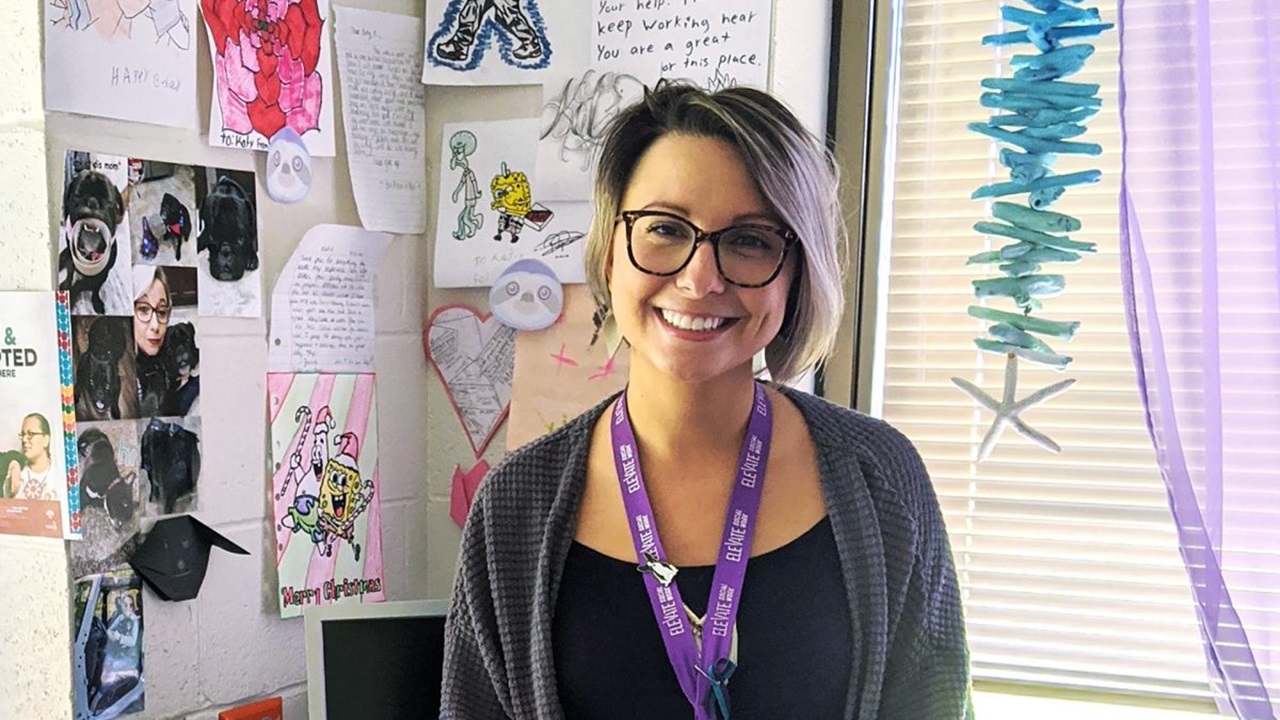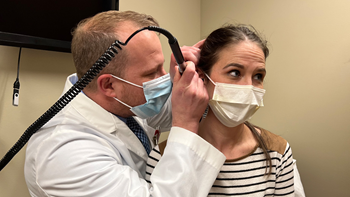Service to Others Defines Social Work Grad

“I’d always been interested in the brain and how it affected human behavior,” Anderson recalled. That led her to major in psychology, and it was in that field that she earned her undergraduate degree. But while at USD, the Ponca, Nebraska, native began to ponder a profession that involved more active advocacy at the individual, family and community levels. “The systems theory aspect of social work was appealing to me,” explained Anderson. “This approach acknowledges that human behavior is multidimensional and influenced by a variety of factors within a system. Social workers employ an integrated approach to recognizing and addressing missing elements of this system in order to improve a client’s circumstances.”
Responding to that more nuanced interest, she enrolled in USD’s social work graduate program, and in 2018 she earned an MSW (Master of Social Work) and soon after started work at the State of South Dakota’s Human Services Center (HSC) in Yankton. HSC is South Dakota’s only state operated psychiatric hospital, and it provides acute psychiatric treatment for adults and adolescents, adult psychiatric rehabilitation and adult chemical dependency treatment, as well as nursing home care to patients who are unable to be served in less restrictive settings.
“My work in the MSW program was demanding,” said Anderson. “It was a whirlwind of activities and trainings, including internships and a graduate teaching assistantship. USD opened many doors for me, and the demanding nature of the full-time program was advantageous. Once I started at HSC, I was ready for the variety of fast-paced and ever-changing challenges I encountered and continue to encounter.”
Anderson, a psychiatric social worker, serves HSC in its adolescent admissions unit. She accompanies and assists a psychiatrist and a multidisciplinary team as they make their rounds, and she conducts group meetings, suicide risk assessments and therapy sessions with at-risk youth and their families. She also serves as a clinical instructor for students interested in the mental health field.
“This setting not only has me working on treatment planning and therapies with adolescents, but I see them regularly, just about every day, and they see me through the good days and not-so-good days. My favorite feature of this job,” she explained, “is that I get to do much more than just individual therapy sessions. I have the privilege of stepping into their everyday lives for a brief time, through groups, family meetings, advocating for them and providing crisis intervention for their day-to-day challenges. I view the treatment environment as a microcosm, as a small subset that is reflective of their lives in larger society.
"I love being able to teach them coping skills that can translate to their home lives outside of the hospital."– Katie Anderson, MSW, CSW, QMHP
“Many of the adolescents have experienced trauma and significant stresses in their homes,” Anderson described. “Chronic traumatic stress interferes with brain development, and this can subsequently affect emotional maturity and the ability to cope with stressful situations and hardships.”
According to Anderson, South Dakota ranked sixth in the nation for its suicide rate in 2017. “Some of the adolescents I work with have experienced a suicide in their home,” she said, “and many of them experience their own suicidal thoughts.” At HSC, Anderson organized a virtual grief and loss group for the kids across all three adolescent units, and she leads trainings of HSC staffers on matters related to suicide specific treatment interventions.
“I also teach a dialectical behavior therapy (DBT) concept and skills to the kids I work with called radical acceptance,” said Anderson, as she revealed greater details about her work. Anderson explained that the woman who pioneered this approach described radical acceptance as the process of letting go of the illusion of control and embracing a willingness to notice and accept things as they are without judging. “Radical acceptance,” said Anderson, “helps the kids reduce their own suffering by acknowledging the unchangeable aspect of reality. To quote DBT’s founder: ‘Life can be worth living, even with pain.’”
“The COVID-19 pandemic,” she added, “gave me an opportunity to practice my own radical acceptance of new and dramatic changes to my job. It wasn’t easy, but it ultimately provided me with an opportunity to model that skill as an example for our adolescent clients."
With the pandemic came changes in physically meeting the families of her clients. “Much of what I am now doing regarding family meetings is done via video. It’s always been tricky to conduct virtual family meetings, and now I must facilitate conversation with guardians while also wearing a mask to protect the child alongside me on camera. When you work in a health care field that is rooted in human connections it can be incredibly challenging to do your job during a pandemic when social interaction is discouraged. Staff at HSC have responded to the situation and done amazingly well considering these conditions.”
Anderson’s work has changed not only because of the increased use of technology in meeting with clients and their families. “The pandemic has added significant stress to the families I work with,” she said. “Parents have lost their jobs. There has been sickness in families. This translates into increased risk factors for families already enduring the crisis of having their child hospitalized for psychiatric needs.”
Despite the weighty demands and consequential outcomes of her work, Anderson wouldn’t change her career path.
“You must understand that social workers enter people’s lives at a time when they are not doing well or as well they’d like to do. At HSC and as a social worker I am honored by the privilege of becoming a part of the clients’ lives and I am impressed by their capacity for resiliency. We celebrate successes and endure hardships. You see the whole picture of someone’s life, including some very difficult things. This job is not for everyone. You need your own good coping mechanisms or you won’t make it in this environment. But despite the challenges, I love coming to work. I truly love working in this field.”


